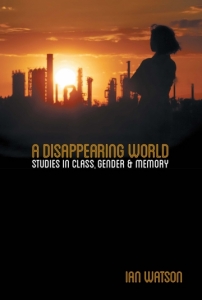A Disappearing World:
Studies in Class, Gender & Memory
By Ian Watson

|
A Disappearing World offers a fascinating glimpse of class and gender relations in two working-class communities in the second half of the 20th century. Drawing on the life histories of fourteen individuals, Ian Watson explores themes of working-class culture, gender and work. He also examines what memory means for personal and social identity. |
Direct quotations from interviews provide a rich and powerful testimony to the dignity of working-class life in Australia. At the same time, they illustrate the physical hardship of manual labour, the violence of patriarchal family life, and the lost potential that accompanied class and gender oppression. While many of these elements endure in contemporary Australia, others belong to a disappearing world. |
Published in 2015 by Australian Scholarly Publishing, Melbourne
(ISBN: 9781925003758) ordering information
|
This beautifully written and moving book recovers the forgotten stories of working-class women and men who lived in two communities, a declining old industrial and mining town, and a new but desperately under-resourced outer suburb. Using rich life-history interviews, Ian Watson probes experiences of work, family relationships, household life, booze, violence, economic and social change. The book shows vividly the creativity of everyday life, and the strategies working-class families and communities themselves evolved for dealing with poverty and stress. This is a notable contribution to our understanding of the realities, rather than the ideologies, of Australian life. |
Raewyn Connell, Professor Emerita, University of Sydney |
|
Brilliantly conceived and beautifully written, this is life history at its best, creating `linkages between personal and social, between present and ongoing, between freedom and constraint'. As a contribution to our understanding of Australia in the second half the twentieth century---one that weaves together transformations in the economy and in educational opportunities, work and family, and the experience of life inside and beyond a small mining community---this is a book without peer. It is a notable addition not only to debates about the methods and meaning of life history but also to debates about class, culture, and gender. |
Murray Goot, Emeritus Professor, Department of Modern History, Politics and International Relations, Macquarie University |
|
This is an outstanding book that brings to life the struggles of individuals in postwar Western Sydney and Lithgow against the constraints of class and gender. It reinforces the significance of oral history and life history as valuable historical and sociological tools for providing insights into the worlds or work, family and home.The book provides an important challenge to those scholars who overemphasise the importance of quantitive methods at the expense of qualitative case studies. |
Greg Patmore, Professor of Business and Labour History, University of Sydney |
| Table of Contents |
1 | Occupational Identity |
2 | Social Memory |
3 | An 'Old Time' Coal Miner |
4 | Cultural Capital |
5 | 'Factory Women' |
6 | Factory and Family |
7 | Shop Work |
8 | A Coal Miner's Daughter |
9 | Building Communities |
10 | Alcohol and Violence |
11 | Creativity and Survival |
12 | Class Reproduction |
13 | Upward Mobility |
14 | Downward Mobility |
15 | Life-history Method |
"He used to sit down at the laundry step at the back and take his boots off, which would be filled with little bits of coal ... He used to wear a grey pit flannel ... And he didn't talk much about it except that, you could see he hated it, you could see that he really and truly hated it. He used to tell us stories about the horses, they had the horses down in the mine, pulling the skips out ...
And I suppose he wasn't even well, even in those days, the dust must have been starting to settle in his lungs and cause ill-health. But he used to go and have a big hot bath, and then he would have a meal, and then he would lie down on the couch that we had in the living room and he would just go to sleep and he'd wake up sometime in the evening and he'd read and he'd listen to the radio, or whatever. And then he'd go off to bed early, because he was really, really exhausted, physically exhausted."
(A coalminer's daughter)